| Listing 1 - 10 of 35 | << page >> |
Sort by
|
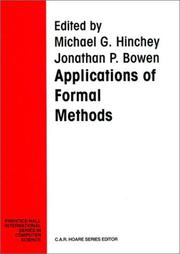
ISBN: 9780133669497 0133669491 Year: 1995 Publisher: London: Prentice Hall,
Abstract | Keywords | Export | Availability | Bookmark
 Loading...
Loading...Choose an application
- Reference Manager
- EndNote
- RefWorks (Direct export to RefWorks)
System Design --- Computer software --- Formal methods (Computer science)
Book
ISBN: 1119174236 1119174228 1119174244 Year: 2018 Publisher: Hoboken, New Jersey : [Piscataqay, New Jersey] : IEEE Computer Society, Inc., IEEE Xplore,
Abstract | Keywords | Export | Availability | Bookmark
 Loading...
Loading...Choose an application
- Reference Manager
- EndNote
- RefWorks (Direct export to RefWorks)
Sales handles: - Introduces the software landscape and challenges associated with emerging technologies - Covers the life cycle of software products, including concepts, requirements, development, testing, verification, evolution, and security - Written by leaders in the software industry - Articles cover both theoretical and practical topics Market description: Primary Audience: Researchers and Practitioners Secondary Audience: Graduate Students--
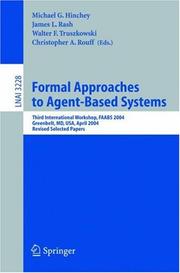
ISSN: 03029743 ISBN: 3540244220 3540309608 9783540244226 Year: 2005 Volume: 3228 Publisher: Berlin : Springer,
Abstract | Keywords | Export | Availability | Bookmark
 Loading...
Loading...Choose an application
- Reference Manager
- EndNote
- RefWorks (Direct export to RefWorks)
The 3rd Workshop on Formal Approaches to Agent-Based Systems (FAABS-III) was held at the Greenbelt Marriott Hotel (near NASA Goddard Space Flight Center) in April 2004 in conjunction with the IEEE Computer Society. The first FAABS workshop was help in April 2000 and the second in October 2002. Interest in agent-based systems continues to grow and this is seen in the wide range of conferences and journals that are addressing the research in this area as well as the prototype and developmental systems that are coming into use. Our third workshop, FAABS-III, was held in April, 2004. This volume contains the revised papers and posters presented at that workshop. The Organizing Committee was fortunate in having significant support in the planning and organization of these events, and were privileged to have wor- renowned keynote speakers Prof. J Moore (FAABS-I), Prof. Sir Roger Penrose (FAABS-II), and Prof. John McCarthy (FAABS-III), who spoke on the topic of se- aware computing systems, auguring perhaps a greater interest in autonomic computing as part of future FAABS events. We are grateful to all who attended the workshop, presented papers or posters, and participated in panel sessions and both formal and informal discussions to make the workshop a great success. Our thanks go to the NASA Goddard Space Flight Center, Codes 588 and 581 (Software Engineering Laboratory) for their financial support and to the IEEE Computer Society (Technical Committee on Complexity in Computing) for their sponsorship and organizational assistance.
Intelligent control systems --- Software engineering --- Congresses --- Mechanical Engineering --- Engineering & Applied Sciences --- Computer Science --- Mechanical Engineering - General --- Information Technology --- Artificial Intelligence --- Computer science. --- Software engineering. --- Computer logic. --- Artificial intelligence. --- Computer simulation. --- Control engineering. --- Computer Science. --- Computer Science, general. --- Control. --- Artificial Intelligence (incl. Robotics). --- Software Engineering. --- Logics and Meanings of Programs. --- Simulation and Modeling. --- Control engineering --- Control equipment --- Control theory --- Engineering instruments --- Automation --- Programmable controllers --- Computer modeling --- Computer models --- Modeling, Computer --- Models, Computer --- Simulation, Computer --- Electromechanical analogies --- Mathematical models --- Simulation methods --- Model-integrated computing --- AI (Artificial intelligence) --- Artificial thinking --- Electronic brains --- Intellectronics --- Intelligence, Artificial --- Intelligent machines --- Machine intelligence --- Thinking, Artificial --- Bionics --- Cognitive science --- Digital computer simulation --- Electronic data processing --- Logic machines --- Machine theory --- Self-organizing systems --- Fifth generation computers --- Neural computers --- Computer science logic --- Logic, Symbolic and mathematical --- Computer software engineering --- Engineering --- Informatics --- Science --- Logic design. --- Control and Systems Theory. --- Artificial Intelligence. --- Design, Logic --- Design of logic systems --- Digital electronics --- Electronic circuit design --- Logic circuits --- Switching theory --- Intelligent control systems - Congresses --- Software engineering - Congresses

ISBN: 1849969698 1852339470 9786610460557 1280460555 1846282713 Year: 2006 Publisher: New York ; London : Springer,
Abstract | Keywords | Export | Availability | Bookmark
 Loading...
Loading...Choose an application
- Reference Manager
- EndNote
- RefWorks (Direct export to RefWorks)
The field of agent & multi-agent systems is experiencing tremendous growth. At the same time the field of formal methods is blossoming and has proven its importance in industrial and government applications. The FAABS (Formal Approaches to Agent-Based Systems) workshops, merging the concerns of the two fields, provided a timely and compelling platform on which the growing concerns and requirement of agent-based systems users that systems should be accompanied by behavioral assurances, could be discussed. This book has arisen from the overwhelming response to FAABS ’00, ’02 & ’04 and all chapters are updated or represent new research, and are designed to provide a more in-depth treatment of the topic. Examples of how others have applied formal methods to agent-based systems are included, plus formal method tools & techniques that readers can apply to their own systems. Agent Technology from a Formal Perspective provides an invaluable in-depth view of the key issues related to agent technology from a formal perspective, for both researchers and practitioners. This is a relatively new interdisciplinary field, and there is enormous room for further growth The book not only creates an initial foundation, but points to the gaps; indicating open problems to be addressed by future researchers, students & practitioners.
Design. --- Intelligent agents (Computer software). --- Engineering & Applied Sciences --- Computer Science --- Intelligent agents (Computer software) --- Formal methods (Computer science) --- Agents, Autonomous (Computer software) --- Agents, Cognitive (Computer software) --- Agents, Intelligent (Computer software) --- Assistants, Cognitive (Computer software) --- Assistants, Intelligent software --- Autonomous agents (Computer software) --- Cognitive agents (Computer software) --- Cognitive assistants (Computer software) --- IAs (Computer software) --- Intelligent agent software --- Intelligent software agents --- Intelligent software assistants --- Software agents (Computer software) --- Special agents (Computer software) --- Computer science. --- Mathematical logic. --- Artificial intelligence. --- Computer Science. --- Mathematical Logic and Formal Languages. --- Artificial Intelligence (incl. Robotics). --- AI (Artificial intelligence) --- Artificial thinking --- Electronic brains --- Intellectronics --- Intelligence, Artificial --- Intelligent machines --- Machine intelligence --- Thinking, Artificial --- Bionics --- Cognitive science --- Digital computer simulation --- Electronic data processing --- Logic machines --- Machine theory --- Self-organizing systems --- Simulation methods --- Fifth generation computers --- Neural computers --- Algebra of logic --- Logic, Universal --- Mathematical logic --- Symbolic and mathematical logic --- Symbolic logic --- Mathematics --- Algebra, Abstract --- Metamathematics --- Set theory --- Syllogism --- Informatics --- Science --- Artificial intelligence --- System design --- Computer programs --- Artificial Intelligence.
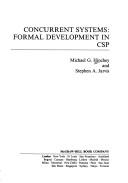
ISBN: 0077076494 9780077076498 Year: 1995 Publisher: London: McGraw-Hill,
Abstract | Keywords | Export | Availability | Bookmark
 Loading...
Loading...Choose an application
- Reference Manager
- EndNote
- RefWorks (Direct export to RefWorks)
Book
ISBN: 0857297724 Year: 2012 Publisher: London ; New York : Springer,
Abstract | Keywords | Export | Availability | Bookmark
 Loading...
Loading...Choose an application
- Reference Manager
- EndNote
- RefWorks (Direct export to RefWorks)
Experience from the DARPA Urban Challenge provides details of the types of systems, software and processes that were used to develop the complex unmanned vehicles that participated in the DARPA Urban Challenge. The vehicle developers explain how autonomous vehicle software in this race was designed and implemented. The chapters range from system and software architecture, navigation, path planning, steering, perception, engineering autonomous systems, and testing and performance evaluation. This book is based on papers from entrants in the Urban Challenge. The content is broken into five parts
Robotics. --- Automatic control. --- United States. --- Research.

ISBN: 3540602712 3540447822 9783540602712 Year: 1995 Volume: 967 Publisher: Berlin : Springer-Verlag,
Abstract | Keywords | Export | Availability | Bookmark
 Loading...
Loading...Choose an application
- Reference Manager
- EndNote
- RefWorks (Direct export to RefWorks)
This book presents the proceedings of the 9th International Conference of Z Users, ZUM '95, held in Limerick, Ireland in September 1995. The book contains 34 carefully selected papers on Z, using Z, applications of Z, proof, testing, industrial usage, object orientation, animation of specification, method integration, and teaching formal methods. Of particular interest is the inclusion of an annotated Z bibliography listing 544 entries. While focussing on Z, by far the most commonly used "formal method" both in industry and application, the volume is of high relevance for the whole formal methods community.
Z (Computer program language) --- Congresses --- Z (Computer program language) - Congresses. --- Software engineering. --- Computer science. --- Algebra --- Combinatorics. --- Software Engineering/Programming and Operating Systems. --- Programming Languages, Compilers, Interpreters. --- Software Engineering. --- Symbolic and Algebraic Manipulation. --- Programming Techniques. --- Data processing. --- Combinatorics --- Mathematical analysis --- Informatics --- Science --- Computer software engineering --- Engineering
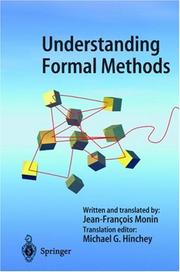
ISBN: 1852332476 1447100433 Year: 2003 Publisher: London Springer
Abstract | Keywords | Export | Availability | Bookmark
 Loading...
Loading...Choose an application
- Reference Manager
- EndNote
- RefWorks (Direct export to RefWorks)
Formal methods (Computer science). --- Computer science --- Formal methods (Computer science) --- System design --- Computers. --- Mathematical logic. --- Computer logic. --- Theory of Computation. --- Mathematical Logic and Formal Languages. --- Logics and Meanings of Programs. --- Computer science logic --- Logic, Symbolic and mathematical --- Algebra of logic --- Logic, Universal --- Mathematical logic --- Symbolic and mathematical logic --- Symbolic logic --- Mathematics --- Algebra, Abstract --- Metamathematics --- Set theory --- Syllogism --- Automatic computers --- Automatic data processors --- Computer hardware --- Computing machines (Computers) --- Electronic brains --- Electronic calculating-machines --- Electronic computers --- Hardware, Computer --- Computer systems --- Cybernetics --- Machine theory --- Calculators --- Cyberspace

ISBN: 3540627170 3540684905 9783540627173 Year: 1997 Volume: 1212 Publisher: Berlin [etc.] : Springer-Verlag,
Abstract | Keywords | Export | Availability | Bookmark
 Loading...
Loading...Choose an application
- Reference Manager
- EndNote
- RefWorks (Direct export to RefWorks)
This book constitutes the refereed proceedings of the 10th International Conference of Z Users, ZUM'97, held in Reading, UK, in April 1997. The volume presents 18 revised full papers together with three invited presentations by internationally leading experts. The papers are organized into topical sections on real-time systems, tools, logic, system development, reactive systems, refinement, and applications. Also a select Z bibliography by Jonathan Bowen is added. All in all, the book competently reports the state-of-the-art in research and advanced applications of the Z notation.
Z (Computer program language) --- Congresses --- Z (Langage de programmation) --- Computer science. --- Software engineering. --- Computer programming. --- Programming languages (Electronic computers). --- Algorithms. --- Computer science --- Computer Science. --- Software Engineering/Programming and Operating Systems. --- Programming Languages, Compilers, Interpreters. --- Software Engineering. --- Symbolic and Algebraic Manipulation. --- Algorithm Analysis and Problem Complexity. --- Programming Techniques. --- Mathematics. --- Computer mathematics --- Discrete mathematics --- Electronic data processing --- Algorism --- Computer languages --- Computer program languages --- Computer programming languages --- Machine language --- Computers --- Electronic computer programming --- Electronic digital computers --- Programming (Electronic computers) --- Computer software engineering --- Informatics --- Mathematics --- Programming --- Algebra --- Arithmetic --- Languages, Artificial --- Coding theory --- Engineering --- Science --- Foundations --- Computer software. --- Data processing. --- Software, Computer --- Computer systems --- Congresses. --- Computer science—Mathematics. --- Z (Langage de programmation) - Congres.
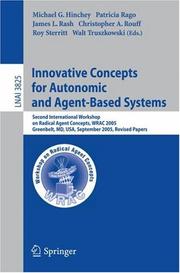
ISBN: 9783540692652 3540692657 3540692665 Year: 2006 Publisher: Berlin ; New York : Springer,
Abstract | Keywords | Export | Availability | Bookmark
 Loading...
Loading...Choose an application
- Reference Manager
- EndNote
- RefWorks (Direct export to RefWorks)
The second WRAC, NASA/IEEE Workshop on Radical Agent Concepts, was held at NASA Goddard Space Flight Center, Greenbelt, MD, September 20–22, 2005. The workshop was sponsored by the Information Systems Division of NASA Goddard and IEEE Computer Society Technical Committee on Complexity in Computing and IEEE Task Force on Autonomous and Autonomic Systems. The workshop also received generous financial support from IBM, without which the workshop would not have been possible. Agent technology, along with autonomous and autonomic computing, has emerged as a major field in computing, and will greatly influence the future development of complex computer-based systems. The area of research is strongly influenced by the autonomic computing initiative as well as by developments in biologically inspired computing, and involves interdisciplinary interaction from those involved in research in social intelligence, psychology, arts, biology, computer science, computer communications and philosophy. This volume includes revised versions of papers presented at the workshop. The workshop was structured so as to allow adequate time for discussion and interaction, to exchange ideas and reflect on the motivations, scientific grounds and practical consequences of the concepts presented. Many of the ideas are truly “radical”, and so authors were given time to revise their papers to reflect further thoughts on the ideas presented and to reflect feedback received at the workshop. We are grateful to Jeff Kephart for a very interesting keynote speech describing IBM’s current and future work in this field, which fit very well with the aims and scope of the workshop.
Intelligent agents (Computer software) --- Software engineering --- Agents intelligents (Logiciels) --- Génie logiciel --- Congresses. --- Congrès --- Autonomic computing --- Computer Science --- Mechanical Engineering - General --- Mechanical Engineering --- Engineering & Applied Sciences --- Information Technology --- Artificial Intelligence --- Computer science. --- Computer communication systems. --- Software engineering. --- User interfaces (Computer systems). --- Artificial intelligence. --- Application software. --- Computer Science. --- Artificial Intelligence (incl. Robotics). --- Computer Communication Networks. --- Software Engineering. --- User Interfaces and Human Computer Interaction. --- Computer Appl. in Social and Behavioral Sciences. --- Application computer programs --- Application computer software --- Applications software --- Apps (Computer software) --- Computer software --- AI (Artificial intelligence) --- Artificial thinking --- Electronic brains --- Intellectronics --- Intelligence, Artificial --- Intelligent machines --- Machine intelligence --- Thinking, Artificial --- Bionics --- Cognitive science --- Digital computer simulation --- Electronic data processing --- Logic machines --- Machine theory --- Self-organizing systems --- Simulation methods --- Fifth generation computers --- Neural computers --- Interfaces, User (Computer systems) --- Human-machine systems --- Human-computer interaction --- Computer software engineering --- Engineering --- Communication systems, Computer --- Computer communication systems --- Data networks, Computer --- ECNs (Electronic communication networks) --- Electronic communication networks --- Networks, Computer --- Teleprocessing networks --- Data transmission systems --- Digital communications --- Electronic systems --- Information networks --- Telecommunication --- Cyberinfrastructure --- Network computers --- Informatics --- Science --- Distributed processing --- Social sciences --- Artificial Intelligence. --- Data processing.
| Listing 1 - 10 of 35 | << page >> |
Sort by
|

 Search
Search Feedback
Feedback About UniCat
About UniCat  Help
Help News
News